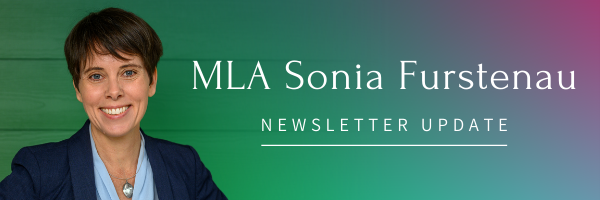SONIA FURSTENAU – In classrooms we frequently ask students to ‘show your work’ ... government too must show its work in health policy
A year
ago, in my new role as leader of the BC Greens, I reflected on a vision for the
future of the province. I identified four goals I think we should be striving
for as a province.
- People’s needs are met, and everyone can reach their full potential
- We protect the natural systems that we depend on for our health and well-being
- Our neighbourhoods and communities are vibrant, safe, and resilient
- Our government, political systems, and institutions are trustworthy
In the future, I will discuss these pillars in the context of a range of BC’s
policy issues. Today I want to focus on public health and healthcare, something
we are all thinking about a lot these days.
Since my last newsletter, the omicron variant has spread so rapidly that for
the first time in the pandemic, more than a third of Canadians know someone
infected (https://nationalpost.com/health/democratization-of-covid-four-in-10-canadians-know-someone-recently-infected-poll-finds).
Case numbers have escalated to the point that BC’s testing capacity has been
overwhelmed, and hospitalizations are rising to new highs, at a time when
healthcare workers are falling ill themselves.
COVID-19 has shown all of us how the prevention of illness and disease is
critical to the whole foundation of our individual and societal well-being. It
has also shown that times of crisis turn the cracks in our institutions into
chasms, underscoring the need to build resilient institutions and
decision-making processes to adapt to and respond to crises quickly.
It is important to recognize that our healthcare system extends beyond the
network of hospitals and clinics and beyond the healthcare professionals who
staff them. It includes all of us, and the institutions and communities that
connect us.
COVID-19 has shown this clearly: it has meant that the decisions made in homes,
in workplaces, in schools, and in our wider communities have implications
for the health of others, with severe impacts for the most vulnerable in
society.
In the early months of the pandemic, we embraced the call to build back
better. Let's not abandon this goal to strive for a healthier, more
equitable future. A strong healthcare system will be an essential part of
achieving this.
How can we better value and support the healthcare staff upon
whom we depend – many of whom are overworked, burnt out, and increasingly
subjected to workplace violence?
How do we ensure that our systems are transparent and accountable? These are essential
for building and maintaining public trust, especially in the context of misinformation.
In classrooms, we frequently ask students to ‘show your work’ in answering a
question. This demonstrates that the answer is justified, that there has
been a process, and evidence considered. Government too must show its work in
health policy by presenting and describing the evidence used to make decisions,
and the intention behind those decisions.
Too often, government decisions are made with minimal transparency and little
discussion of the goals. The logic appears to be rooted in a fear of making
mistakes: if the public doesn’t know what the goal is, they cannot hold
government accountable for missing the mark. But this thinking erodes trust,
and it undermines the capacity for public debate and collaboration – processes
that make our decisions wiser and more just.
COVID-19 has shifted everyone’s attention, but we must still be asking
questions around how we best protect and achieve truly universal healthcare so
that we can best protect the health and well-being of people.
Sonia Furstenau ... is the MLA for Cowichan Valley, and Leader of the BC Greens

Comments
Post a Comment